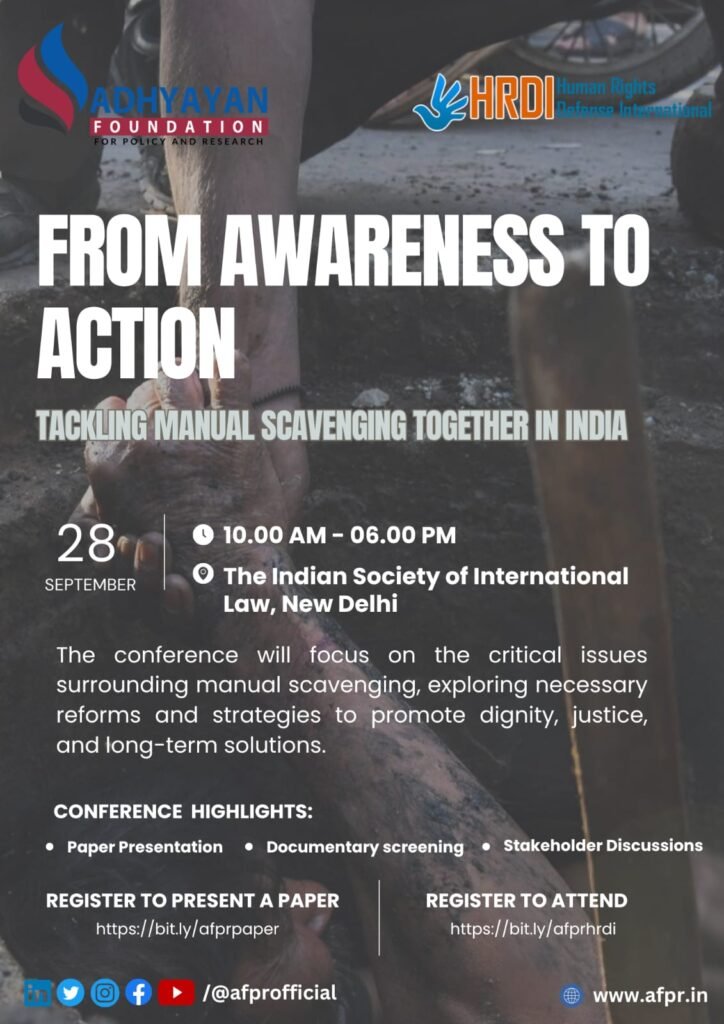About the Conference
The conference aims to start a conversation on manual scavenging and its status in India through a report and select research papers that will be presented at the conference. Moreover, it would see the arrival of essential stakeholders, including but not limited to ministers, judges, government officials, lawyers, researchers, etc. This would allow the collaboration to make a stride forward to advocate for the problems that arise from Manual Scavenging.
Date – 28th September, 2024
Venue – The Indian Society of International Law, New Delhi
About HRDI
Human Rights Defense International (HRDI) was established in 2005 with a steadfast commitment to uphold the principle that all individuals are created equal and are inherently endowed with unalienable rights, including Life, Liberty, and the pursuit of Happiness. We recognise that despite numerous efforts by governments and non-governmental organisations, severe violations of human rights persist, leading to the marginalisation of individuals and various religious and ethnic groups. These vulnerable populations often find themselves without the support of media, human rights organisations, government agencies, and the general public.
Call for Papers: Study on Status of Manual Scavenging in India
The manual scavenging issue remains a grim reality in many parts of India despite being outlawed. The persistence of this practice not only highlights the deep-rooted social and economic inequalities and raises critical questions about the effectiveness of the legal and institutional frameworks in place. To address this pressing issue, AFPR invites Research Papers to delve into the various facets of this problem, from its historical roots to the current challenges and the way forward.
Sub-themes for research papers
- A study of the socio-economic background of manual scavengers, including caste
dynamics, education levels, and economic status. - Analysis of the role of caste in perpetuating manual scavenging, focusing on
marginalised communities. - Evaluation of the effectiveness of rehabilitation programs for manual scavengers,
including skill development, education, and alternative employment opportunities. - Research the health hazards manual scavengers face, including physical, mental, and
social health issues. - Exploration of how technological innovations can help eliminate the need for manual
scavenging, including mechanisation and automation. - Exploration of how intersecting identities (gender, caste, religion) influence the
experiences of manual scavengers. - Analysis of crucial judicial rulings on manual scavenging and their impact on policy
and practice.
*Note – The sub-themes are merely indicative in nature and not exhaustive.
Key Dates
- Last Date for Registration and Submission of Abstract: 17th September 2024
- Submission of Full-Length Papers: 20th September 2024
- Date of paper presentation: 28th September 2024
Submission Guidelines
- Abstracts of not more than 500 words on the sub-themes mentioned above are invited
and submitted as Word documents, with a cover letter containing the name and
designation of the author(s). - There may be a maximum of only two authors for each abstract/paper, and all
participants are permitted to join as co-authors for a maximum of one abstract/paper
only. - The full-length research papers should be 5000-8000 words (inclusive of footnotes).
- Authors must adhere to a uniform mode of citation (21st edition of The Bluebook: A
Uniform System of Citation is recommended).

